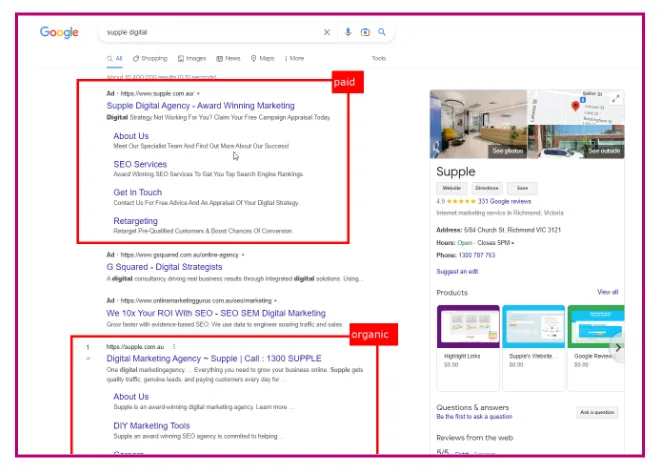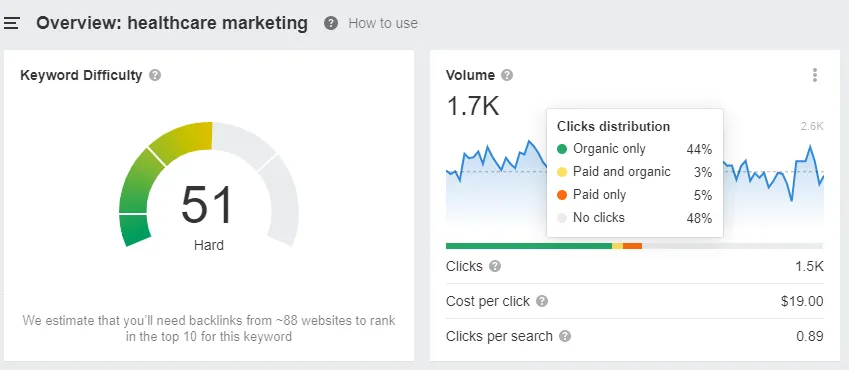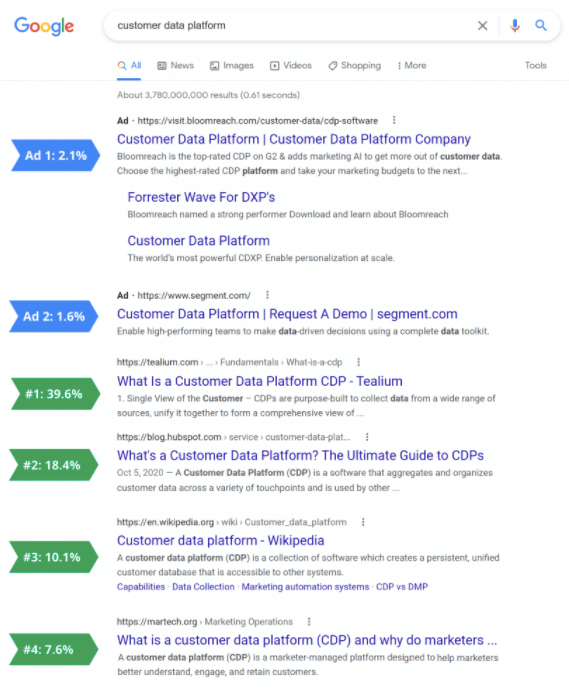SEO vs SEM: Which is Best for Startups?
SEO vs SEM is a common dilemma many startup founders face when choosing an online marketing strategy for their new website.
Both of these marketing strategies can help to expose your startup to a sea of customers both, locally and internationally. But as an entrepreneur, it is critical to identify which is best for your startup between SEO and SEM.
If you’re not able to figure this out on your own, don’t worry. We’re here to guide you through this decision-making process.
In this post, we’ve covered everything there is to know about SEO vs SEM so that you can easily make the right choice between these two most popular online marketing strategies.
With that, let’s get into it!
SEO vs SEM Marketing — Basics
The primary goal of SEO and SEM marketing strategies is to make a website appear as high as possible on the Search Engine Results Pages (SERPs).
Normally, SERPs show two types of search results:
- Paid
- Organic
Paid search engine results are shown whenever a business pays a search engine for placing its ad on top of the SERP for clicks to its website, which is also known as Pay-per-Click Advertising.
The paid search engine results are usually displayed at the top as well as at the bottom positions on the search engine results page.
Here’s a quick example that illustrates the paid and organic search results perfectly on SERP:
On the other hand, organic search results are specific search-related results that are shown for free.
To win the top ranking positions in organic results, one has to perform search engine optimisation on their website.
As a startup owner, you can generate traffic to your website by choosing to appear in both, paid as well as organic search engine results through SEO and SEM marketing strategies.
That said, let’s take a closer look at SEO and SEM.
What is SEO?
Search Engine Optimisation (SEO) is an online marketing strategy that is widely used by startups, businesses, and big brands across the globe.
The primary goal of SEO is to win the top-ranking positions on SERPs to drive qualified traffic to a website by performing a wide range of SEO activities. These activities usually involve:
- SEO audit
- On-page SEO
- Off-page SEO
- Technical SEO
- Keyword research
- Link building
- Competitor analysis
- Backlink analysis
- SERP analysis
- Speed optimisation
- and much more...
As a startup owner, SEO must be a part of your long-term overall marketing strategy, irrespective of whether you opt for SEM or not.
What is SEM?
SEM is the acronym for Search Engine Marketing. Just like SEO, SEM also helps startups to secure top-ranking positions on SERPs via Pay-per-Click Advertising.
The primary goal of SEM is to win the bid for the first paid search results on SERPs. Between the SEO vs SEM battle, SEM is often preferred by startup owners who want to drive immediate and targeted traffic to their website and gain traction for their business quickly.
For example, if you’re a startup that provides Financial services in Brisbane, SEM can help to generate traction for your new startup in its initial days.
However, the downside of SEM is that you need to continually pour money into Google Ads constantly to show your Ad on SERPs and the traffic drops dead the moment you turn off your Ad.
Wherein, SEO may take longer than SEM to start generating traffic, but it is a much more cost-effective option and a reliable strategy for long-term success.
The best part? — Irrespective of the platform upon which your startup’s website was developed, be it WordPress, Squarespace, Wix, or custom-developed, you can easily utilise SEO to rank for top-ranking organic search results in SERPs.
Ultimately, both online marketing strategies have their advantages and disadvantages.
And as a startup owner, you must be aware of SEO vs SEM advantages and disadvantages to be able to make an informed decision.
SEO vs SEM — Advantages and Disadvantages
Here are the pros and cons of SEO & SEM that every startup owner needs to learn about before embarking on their online marketing journey.
SEO Advantages
Let’s start with the SEO advantages to understand why it’s a good investment for your long-term marketing strategy.
SEO can drive targeted traffic & generate qualified leads
Organic search traffic is by far the best quality traffic that’s out there. This is because people visiting your website using specific search phrases are more likely to purchase your products, solutions, or services that your startup may be offering.
Compared to paid traffic, organic traffic can generate more than 8x times more qualified leads.
Here’s a quick example of the comparison of organic vs paid clicks for the “healthcare marketing” search phrase.
As you can clearly see, only 5% of the clicks go to paid ads, while 44% of the clicks go to organic search results.
This clearly proves that SEO doesn’t just drive targeted, organic traffic to your website, it also brings in the majority of qualified leads.
So by investing in SEO, you can position your startup’s website to receive a huge amount of organic search traffic & win a larger share of qualified leads compared to paid search results.
SEO is cost-effective in the long run
Whether you’re a newly-launched startup, an established business, or a blue-chip company, SEO is very cost-effective for all kinds of businesses in the long run.
You see, your target audience is already actively looking online for what your startup is offering. And given the fact that organic search traffic wins more clicks on SERPs, the overall SEO will be more cost-effective in the long run for your startup.
This is especially true because you don’t need to pay for clicks since SEO will help in winning top-ranking organic positions in SERPs unlike with PPC strategy.
All you need is a competent SEO Agency that can perform all SEO activities strategically so that Google deems it traffic worthy and ranks your startup’s website on top organic search results.
SEO has higher long-term ROI compared to SEM
When it comes to long-term ROI, SEO is the holy grail of online marketing.
Though you might have to spend more money initially to get your SEO strategy established and campaigns running, you’ll definitely be able to recoup this cost (and surpass it exponentially) in the long run.
That’s because once your startup’s website starts to rank in top organic positions in SERPs, your organic search traffic will begin to grow gradually.
And once it secures those top organic positions in SERPs, the ongoing cost to maintain those top rankings is significantly low compared to SEM, which mostly costs the same throughout the entire period of your ad campaign.
Top SEO rankings make money 24/7
Top organic rankings obtained through SEO don’t sleep.
Unlike paid ads that only run as long as you keep paying for the clicks, top organic rankings work 24/7 to drive continuous traffic to your startup’s website and generate qualified leads.
The best part? — you don’t need to pay a single penny for the clicks to your startup’s website.
SEO Disadvantages
Everything has its upsides and downsides and SEO is no exception. So, it’s equally important to be aware of the cons of SEO to make a fully-informed decision as a startup owner.
SEO takes a minimum of 6-12 months to generate results (sometimes even more!)
Remember the old saying that goes like this — Rome wasn’t built in a day?
Well, the same applies to SEO as well!
If you’re considering utilising SEO for your startup’s website, then the first thing you must know about SEO is that it normally takes a minimum of 6-12 months to start generating your desired results.
In highly competitive industries, it may take even more than a year before your website can start showing up in top organic search results. The point is that attaining top organic positions in SERPs is difficult but impossible.
The right SEO Agency can even expedite your website’s performance in SERPs and you may win top organic positions sooner than you think.
SEO is an ongoing process
SEO isn’t a one-and-done strategy. Rather, it’s an ongoing process that requires you to put in time and effort.
Put it simply, you need to keep nurturing your SEO strategy for it to maintain top organic rankings in SERPs and continue driving targeted traffic to your website.
This means you need to produce fresh content consistently, build new backlinks to your website from relevant, external websites, keep up with technical SEO updates, and so on.
SEO isn’t cheap, it’s just cost-effective
SEO is a cost-effective online marketing strategy, not a cheap one. In the SEO context, cheap and cost-effective are quite the opposite.
This is because SEO requires a significant amount of monthly investment in its initial days to attain top organic positions in SERPs.
You have to have a budget for content production, content promotion, content expansion, content distribution, content marketing, on-page SEO, off-page SEO, technical SEO, link building, and so on to be able to generate results within 6-12 months.
A single Google penalty can destroy everything
A Google penalty can inflict a significant negative impact on your website’s rankings based on the latest Google search algorithm updates.
Just recently, Google launched three back-to-back search algorithm updates — Helpful Content Update, Core Algorithm Update, and Product Review Algorithm Update.
Many websites and blogs got penalised by these three updates, but most of them were able to make a full Google penalty recovery as they were practising legit (white hat) SEO techniques.
However, if you utilise shady or black hat SEO tactics to shorten the time to rank your startup’s website in top organic positions, the next Google search algorithm update can easily wipe out your website’s rankings from SERPs.
SEM Advantages
Now that you have finally learned SEO advantages and disadvantages, it’s time to do the same for SEM.
Just like we did with SEO, we will start off with the pros of SEM.
SEM is best for generating instant results
If you’re looking for FASTER ways to generate traffic to your website, SEM might be a better online marketing strategy for your startup.
This marketing strategy is especially useful for creating hype for time-sensitive events such as new product launches, limited-period sales, etc.
SEM can help to rank for competitive search queries
Ranking for highly-competitive keywords organically can take a very long time, especially if you’re a new startup and haven’t even established your brand in your market.
But if you still want to rank for those highly competitive keywords in top SERP positions because they have high search volume & massive business potential, you can consider utilising SEM.
By bidding on those highly competitive keywords, you can instantly rank your website on the top paid search results, steal clicks from your competitors’ top organic search results, and drive targeted traffic to your website.
SEM can be good for retargeting strategy
One of the main distinctions between SEO and SEM is that SEO cannot help with retargeting visitors who previously visited your website but did not take the desired action.
On the other hand, SEM can help you tag those visitors and show them your ads on other websites they visit with the goal to bring them back to your website.
So if retargeting is part of your overall online marketing strategy, SEM can definitely help you with remarketing ads.
SEM Disadvantages
Now that we’ve established the upsides of SEM and how it can help for immediate ranking, instant traffic, and is great for the short term, let’s talk about its drawbacks as well.
Most searchers ignore “paid results”
Most searchers nowadays have started to ignore the paid ads on Google search results and head straight over to the organic results.
According to data from firstpagesage.com, 94% of searchers now skip the paid results and actually prefer organic search results only.
That means the chances of capturing the larger share of clicks via paid ads are significantly low and you might actually end up winning just 2% of the total clicks for any particular keyword.
SEM is very expensive
Despite the low CTR, SEM is still very expensive, especially for the high search volume & high-competition keywords.
Let’s bring back the “healthcare marketing” example.
Based on the rate of $19.00 USD, it could cost you around $28,500 a month to receive the same amount of clicks to your website.
And the worst part? — You lose all traffic coming from your paid ad on this particular keyword the moment you terminate your Google Ads campaign.
SEM demands specialised resources
On top of being expensive, SEM also requires specialised resources, especially in the beginning.
This is because when you first launch your Google Ads campaign, your quality score tends to be very low at first by default. And improving this quality score is essential for winning the bid for top-paid ad placement in Google SERPs.
When should you Invest in SEO vs SEM as a Startup?
| SEO | SEM |
|---|---|
| SEO #1 - You have a Limited Budget You should probably focus on SEO if you’re a bootstrapped startup with a tiny budget. While it can take some time to see the results, it makes more sense than burning your limited marketing budget for a couple of paid clicks every month. | SEM #1 - You have a Luxury Budget If you have the luxury to spend as much as you’d like, you can consider SEM as your online marketing strategy. Moreover, you can always set a strict budget to keep your ad spending in check. |
| SEO #2 - You can Wait For Results SEO takes its sweet time to kick in. So if you can wait 6-12 months for the results, SEO is certainly the right marketing approach for you. | SEM #2 - You want Instant Results If you have the budget and just can’t wait the usual 6-12 months period for organic traffic to start rolling in, you can consider utilising SEM in your startup marketing strategy. |
| SEO #3 - You’ve Good Link Building Skills Link building is equally important (if not more) as creating high-quality content to rank in top search results in SERPs. And if you have good link-building skills, you can use that to your advantage and outrank your competitors on Google FASTER as backlinks are known to be one of the top-ranking signals. | SEM #3 - You can Effectively Manage an Adwords Account On paper, PPC sounds simple. Bid on your high search volume keywords & get traffic. In real life, it is never the case. It requires you to have thorough practical knowledge of Google ads management, which is not something you can master in a day or even a year. |
If you’re still not able to figure out which is best between SEO and SEM for your startup based on their advantages and disadvantages, there is still hope.
To make the decision process more simpler for you, we’ve created a simple comparison table to help you figure out which online marketing strategy is ideal for your startup.
SEO vs. SEM — Final Verdict
SEO vs SEM is a question many startup founders ponder when they’re looking to establish their brand online.
On one hand, there is SEO which is quite similar to working out and eating the right diet for 6-12 months in order to get lean, build muscle mass, and get six-pack abs.
On the other hand, there is SEM which is more similar to energy drinks that give you a quick boost but need a continuous recharge.
The bottom line is that when picking between SEO vs SEM as a startup, the final decision always boils down to specific factors — your budget, your patience, and your long-term goals.
That said, if you’ve made your decision and are looking for a competent Digital Agency with the right balance of experience & expertise, feel free to get in touch with us at any time.
DIGITAL MARKETING FOR ALL OF AUSTRALIA
- SEO AgencyMelbourne
- SEO AgencySydney
- SEO AgencyBrisbane
- SEO AgencyAdelaide
- SEO AgencyPerth
- SEO AgencyCanberra
- SEO AgencyHobart
- SEO AgencyDarwin
- SEO AgencyGold Coast
- We work with all businesses across Australia




